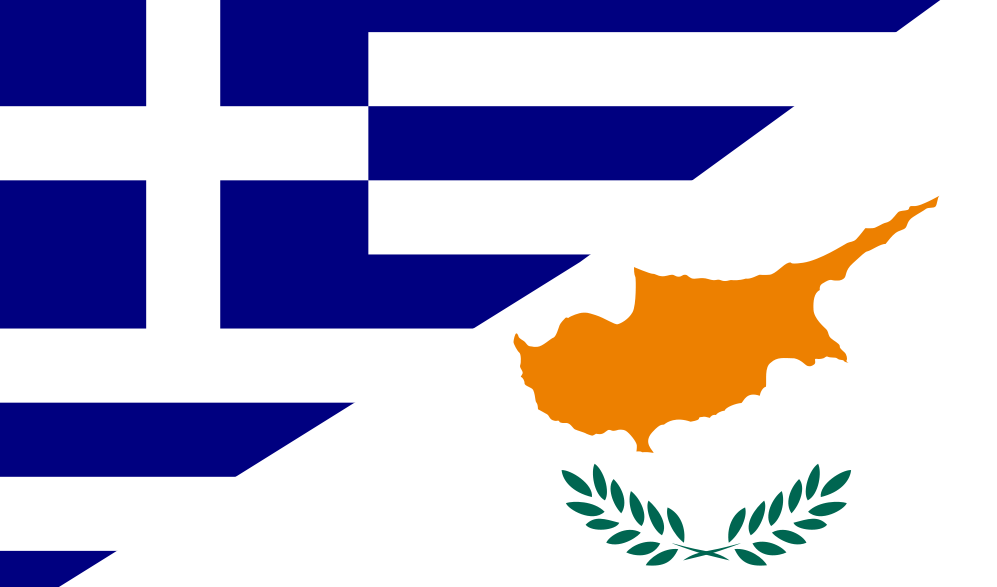
Photo by Cyprus Mail.
Reunification of the tiny Mediterranean island of Cyprus, divided since Turkey occupied the northern half in 1974, has never looked likelier. Under the auspices of the United Nations, leaders of the Greek and Turkish Cypriot communities are meeting to negotiate a unity deal. Discovery of a small but potentially lucrative supply of natural gas off the southern coast is a strong economic incentive for a settlement. And just two weeks ago, US Secretary of State John Kerry promised to get “personally involved” in the peace process. What the international community has come to call “The Cyprus Problem” might, after forty years, be reaching a conclusion.
The Halloumi Problem, however, is just getting started.
Halloumi, or hellim, is a salty, doughy, white cheese produced only in Cyprus. According to some estimates, it makes up roughly a quarter of the island’s total exports. For over a decade, the internationally-recognized Republic of Cyprus (RoC), dominated by citizens of Greek descent, has benefited from a trade agreement with the United States granting the RoC exclusive use of the name “halloumi.”
In July of this year, the RoC re-submitted a long-dormant Product of Designated Origin application for halloumi sales to the European Union. Producers of PDOs — such as Champagne, Feta or Parmesan — must follow stringent rules regulating manufacture and composition; in return, nobody but licensed producers are allowed to market their wares under the PDO’s name. (Only sparkling wines made in the Champagne province of France are allowed to be sold as “Champagne”; only licensed Greek producers are allowed to sell their crumbly white cheese as Feta.)
The benefits of PDO status, at least according to preachers of the PDO cloth, are manifold and include increased brand notoriety, higher sticker prices and the preservation of traditional modes of production. But even before the RoC re-filed its application three months ago, Cypriots on both sides of the UN-patrolled Green Line raised vocal protest. Last week, the Turkish Cypriot Chamber of Industry filed five cases at the Supreme Court challenging the RoC’s right to apply for PDO status for halloumi. “Turkish Cypriot producers were not involved in the registration process, were not consulted, were not given information and as a result the whole process is not fair for Turkish Cypriot producers,” Turkish Cypriot Chamber of Industry chairman Ali Cirali told reporters.
The core of Turkish Cypriot worry is a suspicion that any inspections carried out on their facilities by EU agricultural officers to ensure PDO compliance will be biased: The Turkish Republic of Northern Cyprus, a pseudo-state recognized only by Turkey, is not technically in the EU — but the RoC is. Turkish Cypriot cheesemakers claim the RoC will sway inspectors to declare TRNC dairy farms noncompliant and strip them of their right to make PDO cheese. Moreover, Turkish Cypriots are unhappy that the name “hellim” seems to be given short shrift in the new PDO application. Turkish Cypriot discontent is the first stumbling block to halloumi’s PDO recognition: In order for the PDO application to come into force, it will have to be ratified by the entire island — both the Greek south and occupied Turkish Republic of Northern Cyprus.
And Greek Cypriot cheesemakers are no happier. In order for halloumi to be considered a PDO, the recipe listed in the application must draw on historical precedent (remember, PDO is all about preserving traditional products from the winds of globalization). But whereas historically, halloumi was made with goats’ and sheep’s milk, halloumi today is made almost entirely with cows’ milk. Goats and sheep don’t produce as much milk in the summer, when demand for halloumi is highest. Cows’ milk is cheaper and easier to obtain, especially on an island with diminishing grazing land — essential to husband goats and sheep, but not cows.
The RoC sought to reach a happy medium in 2012 by decreeing that true halloumi — PDO-standard halloumi — be made with “at least 50 percent” goats’ and sheep’s milk. But only 10 percent of halloumi currently produced in Cyprus meets that high bar.
Protests over the government’s unilateral ruling took an especially sour turn in the spring and summer of 2012, when Greek Cypriot cheesemakers parked their goats outside the presidential palace and threatened to dump 400 tons of milk in the streets if the cheese law passed — a symbol of the unused cows’ milk that would spoil in warehouses as a result of the new standards for halloumi, a cattle farmers’ union representative told reporters. (When the law passed hours later, only 27 tons of milk were spilt outside the palace gates — not much to cry over.)
In July of this year, dairy unions promised to file cases with the Supreme Court disputing the PDO application. “I’m telling you that at present, there is less than 5 percent [sheep and goat milk] available in the market. My farm produces 80 tons of cow’s milk per day. If the [agriculture] minister can come up with 20 percent of that in goat and sheep milk then I take my hat off to him,” Pancyprian Organization of Cattle Farmers president Savvas Evangelou told media in July.
It’s tempting to look at the Halloumi Problem as the Cyprus Problem in quaint microcosm: A seemingly simple step, with benefit for both communities — both attainment of PDO status and re-unification would undisputedly benefit both communities — is stymied on either side of the buffer zone by top-down government dictates, ignoring the wishes of their constituents. It’s hindered by vested economic interests, emotions running high,and inflammatory rhetoric that obscures reasoned discourse. And it’s blocked by the fact that Cyprus is too small to command any great power’s attention for more than the blink of an eye (except for Britain, which stepped in to quell initial guerilla uprisings in the ‘50s; Britain also attempted to squash halloumi-related squabbles this summer).
Such a comparison is tempting, but mistaken. The battle over halloumi is undoubtedly a symptom of the communal tensions that have wracked Cyprus since at least the late 1800s, spinning into a fever pitch in the 1950s, ‘60s and ‘70s. The real and psychological scars left by those years have not yet faded. And that’s one area where the Halloumi Problem looks less like a problem and more like a solution. A successful PDO application will not only bring economic benefits for cheesemakers on both sides of the Green Line, it could serve as a confidence-building measure: After years of seeing that their facilities are not being given short shrift by EU inspectors, Turkish Cypriot cheesemakers might began to back down from their hard line on their Greek Cypriot counterparts. Perhaps cheesemakers in the two communities could work together to bring halloumi (or hellim) to new markets.
Until the European Commission ruling on the RoC’s PDO application — expected to arrive no sooner than November 2015 — cheesemakers in both the RoC and TRNC will have sole rights to the names “halloumi” and “hellim.” For now, perhaps, the Halloumi Problem is best left to ferment.
